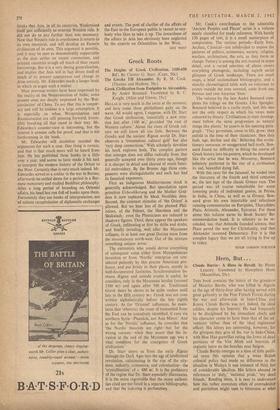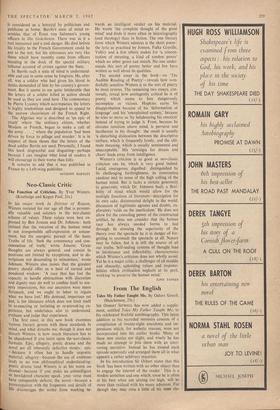Hero, But ...
Claude Barres : A Hero in Revolt. By Pierre Lyautey. Translated by Humphrey Hare. (Macmillan, 25s.)
THIS book contains the letters of the grandson of Maurice Barres, who was killed in Algeria at the age of thirty-four after having served with great gallantry in the Free French Forces during the war and afterwards in Indo-China and Korea. Claude Barres was not, indeed, the ideal soldier, despite his bravery. He had frequently to be disciplined by his immediate chiefs and his character seems to have been that of the ad- venturer rather than of the ideal regimental officer. His letters are interesting, however, for the glimpses they give of the war in Indo-China, with Hoa Hao guerrillas eating the livers of dead partisans of the Viet Minh and intervals of orgiastic leave on the beaches near Saigon.
Claude Barres emerges as a man of little politi- cal sense (his opinion that a wiser British colonial policy had made no difference to the situation in Malaya is one instance of this), but of considerable idealism. /His letters abound in references to `duty,"national pride,' my dead friends.' Reading them, it is easy to understand how this rather immature ethos of comradeship and patriotism might turn to bitterness at what
is considered as a betrayal by politicians and publicists at home. Barres's state of mind re- sembles that of Ernst -von Salomon's young officers in Die Geeichteten. There was in it a real innocence and a real danger. He died before his loyalty to the French Government could be put to the test, but his utterances are very like those which have recently come from officers standing in the dock of the special military tribunal accused of crimes against the State.
In Barres such a state of mind is understand- able and can in some sense be forgiven. He, after all, was a soldier who had given his blood in duties demanded of him by his country's govern- ment. But it seems to me quite intolerable that the letters of a soldier killed in action should be used as they are used here. The commentary by Pierre Lyautey which accompanies the letters is highly tendentious and designed to appeal to the narrow chauvinism of the French Right.
The Algerian war is described as 'an epic of Youth' where 'the ordinary citizen, whether Moslem or French, began to make a cult of the army . . . ,' where the population 'had been driven by force to pillage and murder.' It is in support of these theses that the letters of the dead soldier Barres are used. Personally, I found this book disgraceful and disgusting—perhaps because I can imagine what kind of readers it will encourage in their worse than folly.
It remains to add that it was published in France by a Left-wing publisher.
ANTHONY HARTLEY



































 Previous page
Previous page